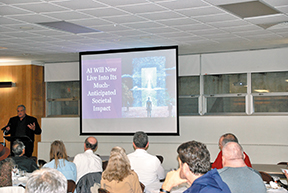
The recent explosion of artificial intelligence (AI) has been met with mixed reactions, from optimism to alarm to confusion.
What exactly is AI? How is it being used? Are there legitimate and ethical uses for it that align with Catholic values?
Dr. Timothy Carone addressed these questions and more at a recent lecture called “The Human Simulacrum: The Good, The Bad, and the Ugly of AI,” given at Blessed Sacrament Parish in Madison.
Defining AI
Dr. Carone is a lecturer with the College of Business and Economics at the University of Wisconsin-Whitewater who teaches machine learning, cyber security, and information technology.
He is also Catholic, and his lecture dove into the opportunities and challenges that AI presents to the world and to the Church.
AI, Dr. Carone said, dates to the 1940s and 1950s when people “wanted machines to exhibit human-like intelligence behavior.”
That has been the goal since day one, and it seems like recent, popular systems of AI such as ChatGPT (GPT stands for “generative pre-trained transformer”) have achieved this; they are often used to generate content such as text, answers to questions, and images based on prompts that a user inputs.
These systems, said Dr. Carone, have advanced from simple predictive text formulas (in which it tries to “guess” the next word based on the word that comes before it) to generating output based on the context of the entire prompt.
This involves “pre-training” the system to recognize patterns in prompts.
Where problems arise
As helpful as AI tools can be, Dr. Carone pointed out that they are subject to bias depending on the sources of the data that AI uses to generate output.
To illustrate, Dr. Carone showed an image in his slideshow that was generated using AI; he asked a model to create the image using the words “bad AI,” and he pointed out that one of the human figures in the image looks a lot like Donald Trump.
He also prompted the model to create a “good AI” image, and it featured Barack Obama and Hillary Clinton.
What’s “good” and “bad” depends on who’s setting up the AI system.
Because of this vulnerability to bias, Dr. Carone expressed concern about AI accelerating social divisions and being used for sinister purposes.
“The danger of this sacralization of technology is that it takes on a role of a new secular religion,” said Dr. Carone.
“People depend on it. They want to use it because it gives them control over others and allows them to achieve the outcomes that they want. And the problem is, people don’t see this for what it is.”
“Societies can believe that we’re progressing in a good way beyond tyranny, when in fact, we’re moving directly into tyranny and not realizing it,” Dr. Carone continued. “So technology has to be subordinated to wisdom and virtue and not the other way around.”
A force for good
Still, Dr. Carone said that he sees himself as an optimist and believes that AI can be used for good.
At its best, he said, AI “showcases human innovation and creativity, mirrors human thought, illuminates the intricacies of our creation, and draws parallels with divine artistry.”
He also said that the Church shouldn’t hesitate to combat bad uses of AI by using the technology for good.
During a Q&A that followed his talk, Dr. Carone said that Catholic scientists should not be afraid to bring the Church’s moral wisdom into developing the “guardrails” that AI needs.
He also said that AI can be a powerful tool for evangelization and envisions a sort of “Catholic ChatGPT” that could be programmed to draw upon a variety of Catholic sources to answer questions about the Faith.
To view Dr. Carone’s talk, go to blsacrament.org/dominic-and-the-doctors.

